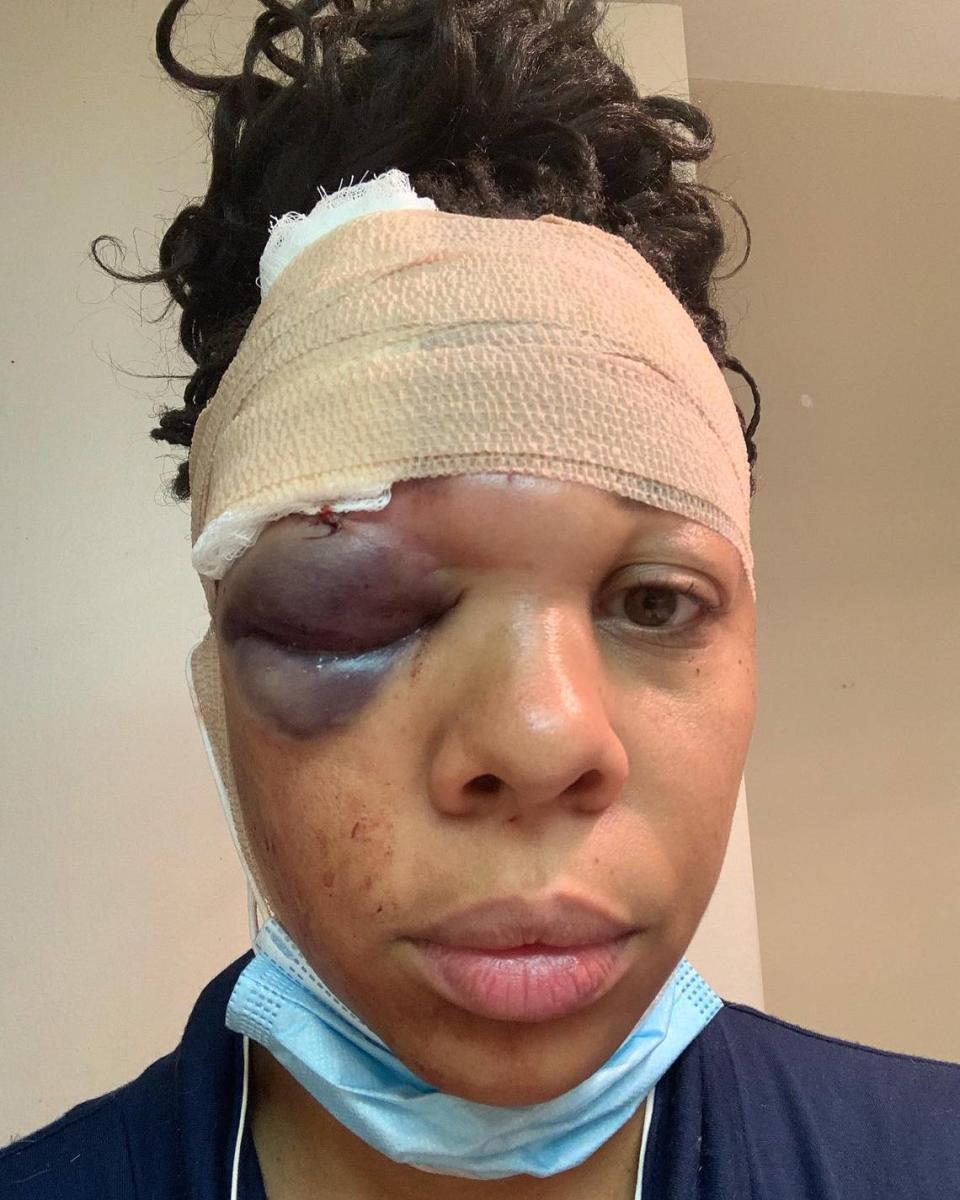FTL woman nearly blinded by cops while protesting peacefully testifies to D.C. lawmakers
Almost exactly a month ago, LaToya Ratlieff was shot in the face with a foam rubber bullet by a Fort Lauderdale police officer as she choked on tear gas at a protest over the death of George Floyd. Monday, still struggling with her eyesight, she testified in front of Congress about her experience.
The 34-year-old, who’s recovering from a fractured eye socket and gash that required 20 stitches, spoke alongside others injured in encounters with police officers by way of a virtual hearing conducted by the U.S. House’s Oversight Subcommittee on Civil Rights and Civil Liberties.
In an interview with the Miami Herald afterward, Ratlieff said she was happy with how the hearing went and grateful for the opportunity to share her story with the nation. Looking forward, she said she’s going to continue to contact local community leaders and nonprofits to see how she can be of service.
How a peaceful march turned ugly: Cops say protesters attacked. Photos tell another story
“Now I have more of an opportunity to be more vocal about my goals and ensuring as many people [as possible] get out and vote in the upcoming election,” she said.
The hearing was held to address “how violent treatment of protesters and journalists across the country by federal and local law enforcement [has] violated the First Amendment,” the subcommittee said in a news release. Other witnesses included Linda Tirado, a freelance photographer who was left blind in one eye after a police officer shot a rubber bullet at her in Minneapolis while she was covering protests, and Gustavo Martinez, a New Jersey journalist who was arrested while covering similar demonstrations in his state.
“As a citizen that was there [at the protest], that was peaceful, that was simply wanting to be part of change and seeing the police brutality I was met with, it just comes off as if they don’t care,” Ratlieff told lawmakers.
The protest took place May 31 in downtown Fort Lauderdale and was largely peaceful until around 7 p.m. Ratlieff was outside a city parking garage at the time, not far from Detective Eliezer Ramos when he fired at her.
She had been trying to calm down protesters after another officer shoved another woman as she kneeled down. Infuriated, some protesters threw plastic water bottles and rocks at the police. They were met with tear gas and rubber bullets.
Ramos, a member of the city’s SWAT team, shot Ratlieff in the face. In his report, he said he was trying to hit someone who was throwing projectiles back at officers. That person was using peaceful protesters as a shield, he said. At the time she was hit, Ratlieff was stumbling around blindly and choking on tear gas.
At the hearing, Ratlieff was introduced by Broward Democratic Rep. Debbie Wasserman Schultz, her congressional representative. She then began her testimony by describing the activist work of her great aunt Fannie Lou Hamer, a civil rights leader who was beaten by police while in custody in 1964.
“She suffered permanent injuries at the hands of police, I still don’t know if I have,” Ratlieff said in her opening statement. “I have little to no vision on my right eye, doctors don’t know if that will change.”
She was later questioned by Wasserman Schultz and committee Chairman Jamie Raskin, a Maryland Democrat.
“It was absolutely astonishing to me that in our community that we could have had this kind of police overreaction,” Wasserman Schultz said. “Did you hear any warning before either the tear gas or rubber bullets were fired?”
“Unfortunately, after what happened to me that wasn’t any verbal warning,” Ratlieff said. “Since that day and a little over a week after what happened, I couldn’t chew for over a week. I still have vision issues in my eye. I still have extreme light sensitivity.”
Ratlieff said she hasn’t received an apology from Fort Lauderdale police.
Meanwhile, Fort Lauderdale Mayor Dean Trantalis said he was surprised Ratlieff was addressing Congress and the media but had not yet given a statement to police internal affairs investigators.
“She lawyered up,” Trantalis said. “What do the lawyers say? I’m a lawyer. I know what I’d tell a client. Don’t ever speak to the other side. But there is urgency.
“I know they’re looking to posture and weigh their options going forward and they want to make sure that their client doesn’t say the wrong thing as they build their case against the city, but the public has a right to understand what’s happening as soon as possible,” he continued. “People want to know. For these folks to hold back, I think interferes with that process. We’re not getting to the bottom of it as quickly as we need to.”
Police posted a similar statement on Twitter.
Evan Ross, a spokesman for Ratlieff, responded: “After shooting her in the head for peacefully and lawfully exercising her First Amendment rights, Fort Lauderdale police continue their assault on LaToya Ratlieff and her right to free speech. Given that their own incident report acknowledges that she was an innocent victim, the chief should be issuing an apology rather than attacking LaToya for sharing her experience with the public.”
Ratlieff’s testimony comes as Congress is at an impasse over reforms involving police conduct.

The Democratic-controlled House of Representatives passed a bill last week largely along party lines that overhauls qualified immunity for law enforcement, prohibits no-knock warrants in federal drug cases, and bans police choke holds at the federal level and classifies them as a civil rights violation. A more limited proposal in the Republican-controlled Senate was blocked by Democrats, who argued the bill doesn’t go far enough. It’s unclear if the two chambers will find a compromise.

